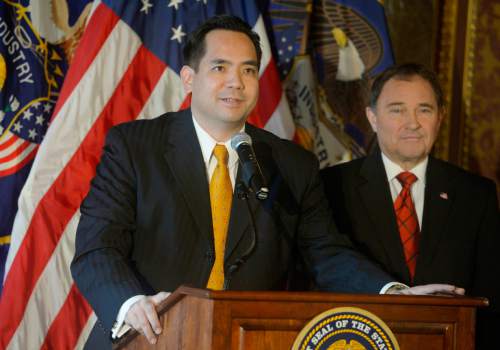This is an archived article that was published on sltrib.com in 2015, and information in the article may be outdated. It is provided only for personal research purposes and may not be reprinted.
Utahns can easily check to see if there are convicted sex offenders living in their neighborhoods by checking online at the state's sex offender registry. But if they're looking to invest, there's no similar site to warn them about convicted fraudsters.
Legislators, however, approved a bill on Wednesday that would establish a state-run registry for convicted white collar criminals to combat Utah's high level of affinity fraud, which occurs predominantly among members of the LDS faith.
The Utah Senate on Wednesday suspended its rules to give final passage to the bill on the second to last day of the 2015 general session of the Legislature. The Utah House already has given thumbs up to the measure. Gov. Gary Herbert indicated after the Senate vote that he will sign it in order to protect "the consumer and the public from fraud and predatory practices," the governor's spokesman, Marty Carpenter, said in a statement.
In Utah, members of The Church of Jesus Christ of Latter-day Saints have been particularly vulnerable because of personal relationships and shared culture among members.
In making the bill a priority for his office, Utah Attorney General Sean Reyes said the state is "sadly known for its high level of financial vulnerability to affinity fraud," which occurs when someone exploits a relationship of trust to defraud another person.
"Utah's unique personal interweavings and close relationships offer a rich environment for predatory behavior and financial crimes in our state," Reyes said in a press release last week.
The bill's chief sponsor, Rep. Mike McKell, R-Spanish Fork, said in an email the bill would "help stem the tide of white collar crime corrupting in our community" by providing residents with readily accessible information.
Under the measure, the attorney general's office would operate the registry as a website that contains offenders' names, aliases, a photograph, physical description and crimes for which they were convicted. Those placed in the registry would have to be convicted of second-degree felony counts of securities fraud, theft by deception, unlawful dealing of property by a fiduciary, insurance fraud, mortgage fraud, communications fraud or money laundering.
About 100 people annually are convicted in Utah of those crimes, said Missy Larsen, the attorney general's spokeswoman.
The information would be maintained online for 10 years or for a lifetime for a third conviction. Those convicted after Dec. 31, 2005, would be required to register with the attorney general's office for inclusion on the registry unless they have complied with all court orders, paid all court-ordered restitution to victims and not been convicted of a further crime. There also are provisions for removing someone's name from the registry after five years.
Brett Tolman, the former top federal prosecutor in Utah who now defends those accused of white collar crimes, said he worried that the crimes included in the registry were overly broad, particularly for communications fraud charges that can be interpreted to cover a wide range of business to business interactions.
The listing could be a stigma for a CEO convicted of a relatively minor offense, he said.
Mark Pugsley, also a white collar defense attorney, said much of the information that would be found in the registry already has been placed online by agencies such as the Utah Division of Securities and federal regulators.
"I think it's unnecessary because all of this information is already out there, easily accessible through an Internet search," Pugsley said in an email.
But white collar defense attorney Brent Baker, who has organized events to educate Utahns about avoiding fraud, praised the effort to establish the registry as "another tool to deter white collar fraud," which often involves elderly victims who need special protection. He pointed to a bill passed in 2011 that enhanced penalties for affinity fraud convictions.
Sen. Curt Bramble, R-Provo, sponsored the bill in the Senate, which won easy passage on the floor.



